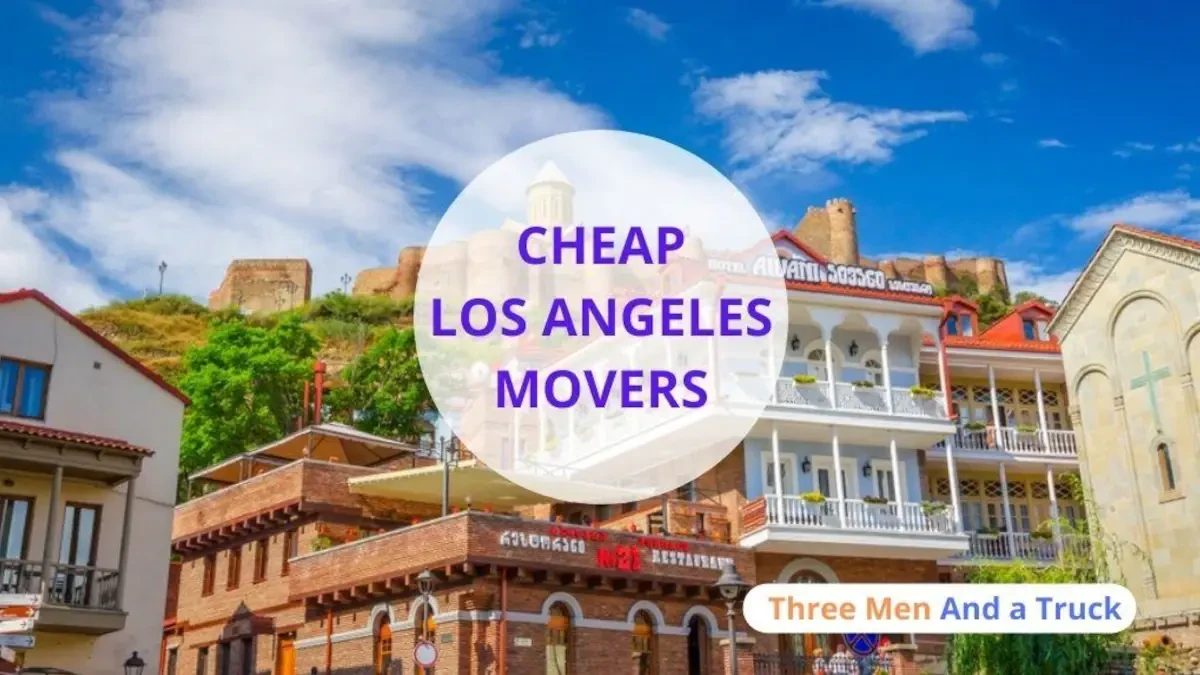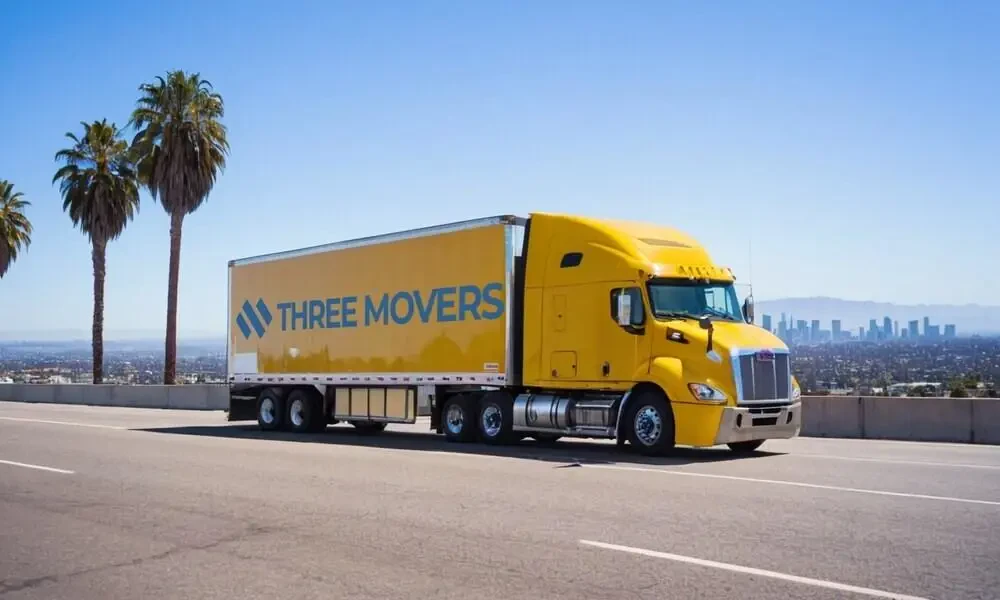Published by Chris Townsend
Last updated Dec, 16 2025

Trusted, Affordable Los Angeles Moving Companies Residents Rely On
If you need a moving company to ship your belongings, whether the destination is a few blocks away or across the country, you can rest assured that Three Movers will deliver everything safely, in time, and at an affordable movers price. If you need more information, we are happy to provide all the details.

Long-Distance Hauling
When it comes to cross country moves, here is what makes us stand out amongst other Los Angeles moving companies:
- Reliable Time Estimates: Planning a residential moving long-distance moves are crucial, as everything must fall into place at the right time every step of the way. With us, you can rest assured that your belongings will get to the destination within the agreed time and all your conditions will be met.
- Delivery in Perfect Conditions: One of our top priorities is to make sure your belongings arrive at their destination without a scratch. We take great care of how we handle, pack, and store your items, and know how to protect your wine collection, fine art items, and how to pack your household items most efficiently to offer peace of mind.
- Efficient Communication: Before the shipment, we always make sure any aspect of the transport is covered during the discussions. We always keep you posted about the status of our shipment, and make sure every client is satisfied.

Local Movers
Even when moving in the same state or even a few blocks away, it doesn’t mean that it’s a simple DIY job. We handle local moves in a matter of hours, at an affordable price or hourly rate. Hiring us for your local om Santa Monica, Culver City, Orange County, Sherman Oaks or West Hollywood move saves you time and money, and you can just enjoy your lunch while we deliver your stuff safely and fast to your new home using our years of experience. Home size doesn't matter to us like other moving companies.
We at Three Movers know that each client has particular specific needs and requires utmost care along with transparent pricing from their LA movers in the moving industry. Our service is impeccable because we take the time to assess what’s needed to make the next move perfectly smooth. From moving your studio apartment to relocating your whole company, we can handle it with professionalism.
Learn More About Our Services:
Here is an extensive list and wide range of the quality moving services we provide, each of them tailored to fit the client’s needs:

- Long-distance moving
- Local hauling
- International moving
- Residential hauls
- Commercial moving
- Transferring to storage unit
- Movers and packers
- Haulers with a truck
- Apartment movers
- Furniture shifting
- Military moving
- Same day shifts
- Apartment moving
- Business relocating
- Office move
- Full service travels
- Cheap shifting
- Packing services / packing materials
- Storage services / storage solutions
- long term storage
- Moving truck
- pool table
- exceptional customer service
If you want to know more about what each of our service packages offers, where we do all the hard work and lifting of heavy items, don’t hesitate to give us a call or fill out a form requesting a quote with no hidden fees by calling the phone number at the top of the site. We'll be ready for you on your move date to help with all your moving needs.
Read testimonials at the bottom of the page about the great experience/stress-free moving experience from our happy customers.

Cost & Time Examples For Transportation
| To / From Los Angeles | Distance | 2 BR | 3 BR | 4 BR |
|---|---|---|---|---|
| LA to Columbia, SC | 2387 | $4296.6 - $5490.1 | $6206.2 - $7638.4 | $8115.8 - $9548 |
| St Paul, MN to City Limits | 1929 | $3472.2 - $4436.7 | $5015.4 - $6172.8 | $6558.6 - $7716 |
| LA to Thousand Palms | 115 | $207 - $264.5 | $299 - $368 | $391 - $460 |
| Boston, MA to LA | 2983 | $5369.4 - $6860.9 | $7755.8 - $9545.6 | $10142.2 - $11932 |
| Local Area to Denton, TX | 1394 | $2509.2 - $3206.2 | $3624.4 - $4460.8 | $4739.6 - $5576 |
| Tempe to Local Area | 380 | $684 - $874 | $988 - $1216 | $1292 - $1520 |
| Los Angeles, CA to Salt Lake City, UT | 688 | $1238.4 - $1582.4 | $1788.8 - $2201.6 | $2339.2 - $2752 |
| Local Delivery to Durham, NC | 2518 | $4532.4 - $5791.4 | $6546.8 - $8057.6 | $8561.2 - $10072 |
| San Diego to City Limits | 120 | $216 - $276 | $312 - $384 | $408 - $480 |
| Los Angeles, CA to Lubbock, TX | 1105 | $1989 - $2541.5 | $2873 - $3536 | $3757 - $4420 |
Popular areas include but are not limited to:
Manhattan Beach, Santa Clarita, North Hollywood, San Fernando Valley, Redondo Beach, Hermosa Beach, Silver Lake, Studio City, Downtown LA, Van Nuys, Palos Verdes Estates, El Monte, El Segundo, Rancho Palos Verdes, Canoga Park, Huntington Beach, South Pasadena, San Marino and other areas of Southern California.
*Flatrate free estimates prices and times are estimated. They can vary depending on the season and other factors. Get a quote custom tailored to you, discounts available for first time customers.

Neighborhood Areas We Serve:
Our local moving services are proud to help with your move in any of the neighborhoods you see below. And if you don't see your neighborhood listed here, don't worry because we can most likely service it.
| Pacific Coast Hwy | Entrada Dr | W Sunset Blvd |
| N Kenter Ave | Brentwood | Riviera |
| Bel Air | Pacific Coast Hwy | Temescal Canyon Rd |
| Lookout Mountain Ave | Wonderland Ave | Mulholland Dr |
| Summitridge Dr | Brentwood Heights | Mount St Mary's College |
| Pacific Palisades |
Resources:
- State of California - Department of Justice - Office of the Attorney General
- Household Movers Information
- California Moving Regulations
- Protect Your Move
- How to change your mailing address and utility services

Popular Routes:

Frequently Asked Questions
The best movers in Los Angeles are licensed, insured companies with verified California and FMCSA credentials, transparent pricing, and strong local reviews. Top-rated movers handle apartments to 5BR homes, understand LA traffic patterns, and manage parking permits, elevators, and narrow streets. Crew size, packing options, and experience with condos and high-rises strongly affect service quality. Many leading companies offer both local and interstate relocations through a dedicated local moving service.
Movers in Los Angeles typically cost $120–$180 per hour for 2–3 movers, with most local moves ranging $600–$1,800. Pricing depends on move size, stairs or elevators, long-carry distance, packing needs, traffic timing, and parking logistics. Larger homes or full packing increase costs. Long-distance moves are priced by weight and mileage and follow FMCSA regulations. Many customers compare options using a reputable long distance moving service.
A Los Angeles move is considered local if it stays within the metro area or under 50–100 miles and is usually billed hourly. Moves beyond that, but still within California, are intrastate and often priced by weight and distance. Any move crossing state lines is interstate and regulated by the FMCSA. Distance, delivery window, and truck allocation all change once a move exceeds local service limits.
Yes. Experienced Los Angeles movers regularly manage apartments and condos with freight elevator schedules, HOA rules, limited loading zones, and narrow streets. Advance notice is critical so crews can plan truck size, manpower, and loading windows. Buildings in Downtown LA, Hollywood, and West LA often require certificates of insurance and reserved parking. Apartment-focused crews are typically booked through specialized apartment movers.
Same-day movers are available in Los Angeles, especially for studios and small apartments, but availability depends on crew scheduling, traffic, and time of request. Morning requests have higher success rates. Last-minute moves may require flexible timing or smaller trucks. Pricing can be higher due to short notice and limited availability. These moves are commonly handled by dedicated same day movers.


